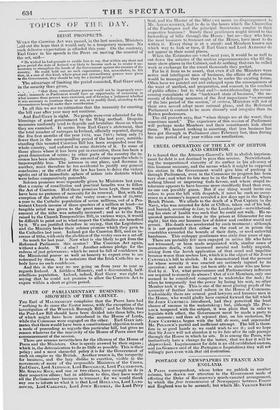TOPICS OF THE DAY.
IRISII PROSPECTS. .
Wriasr the Coercion Act was passed, in the last session, Ministers ld out the hope that it would only be a temporary measure. No such delusive expectation is afforded this year. On the contrary, Earl GREY in his speech to the Peers on moving the renewal of
the act, said-
" lie wished he had grounds to enable him to say, that within any short and given period the state of Ireland was likely to become such as to render it un- necessary to strengthen the hands of the Government against the enemies of the country. lie could hold out no such expectation ; but, nevertheless, he felt that, in a case of this kind, where great and extraordinary powers were given to the Government, they should be only for a limited period."
The advantage of' limiting the period consisted, Earl GREY said,
in the security thus given,
. . . . "that those extraordinary powers would not be improperly exer- cised; inasmuch as Parliament would have an opportunity of examining in what manner those powers were exercised, and of forming a judgment whether it was necessary to continue them or not, or to modify them, according to the circumstances brought under their consideration."
In all this we see no intimation that the necessity for enacting the bill year after year may not continue.
And Earl Gasy is right. No people were ever educated for the blessings of good government by the Whig method. Despotic measures uniformly tend to degrade and brutalize those on whom they are exercised. It seems from Earl GREY'S statement, that the total number of outrages in Ireland, officially reported, during the five first months of the year 1834, was 7869; being only 79
fewer than in the corresponding period of the last year, notwith- standing this vaunted Coercion Bill has been suspended over the whole country, and enforced in some districts of it. In some of those places where it has been put in execution, there has been a
great diminution of crime; in other parts of the country the in- crease has been alarming. The amount of crime upon the whole is
imperceptibly less. The increase in one place, and decrease in another, must therefore be too accidental to justify any general conclusion ; or the effect of the law has been to drive the violent spirits out of its immediate sphere of action into districts which were before comparatively peaceable. Solemn promises were repeatedly given by Ministers last year, that a course of conciliation and practical benefits was to follow the Act of Coercion. Had these promises been kept, there would
have been no pretence of necessity for its renewal. But, with the exception of the abolition of the vestry cess—a boon of 35,000/.
a year to the Catholic population of seven millions, out of a Pro-
testant Church income of three quarters of a million at least—no tangible relief was given to the great mass of the people. The ( amount of the tithe was actually increased ; and as to the fund raised by the Church Temporalities Bill, in various ways, it would
be difficult to point out in what respect the Catholics are benefited by it. We are justified therefore in saying, that the Legislature and the Ministry broke their solemn promise which they gave to the Catholics last year. Ireland got the Coercion Bill, and an in-
crease of tithe, with only the abolition-of the vestry cess as a set-off. So much for last year. Now what is she likely to get from the Reformed Parliamen this session? The Coercion Act again, without a doubt. W c.,t else? Another solemn pledge for the redress ofjust grievances; which he must be full of confidence in the Ministerial power as well as honesty to expect ever to see
redeemed by them. It is notorious that the Irish Catholics as a body have no such confidence.
And this is the way we are going on from year to year as regards Ireland. A faithless Ministry, and a discontented, half- rebellious population. Indeed, indeed, Earl GREY was right in saying that he could not promise to allow the Coercion Act to expire within a short or given period.




















 Previous page
Previous page